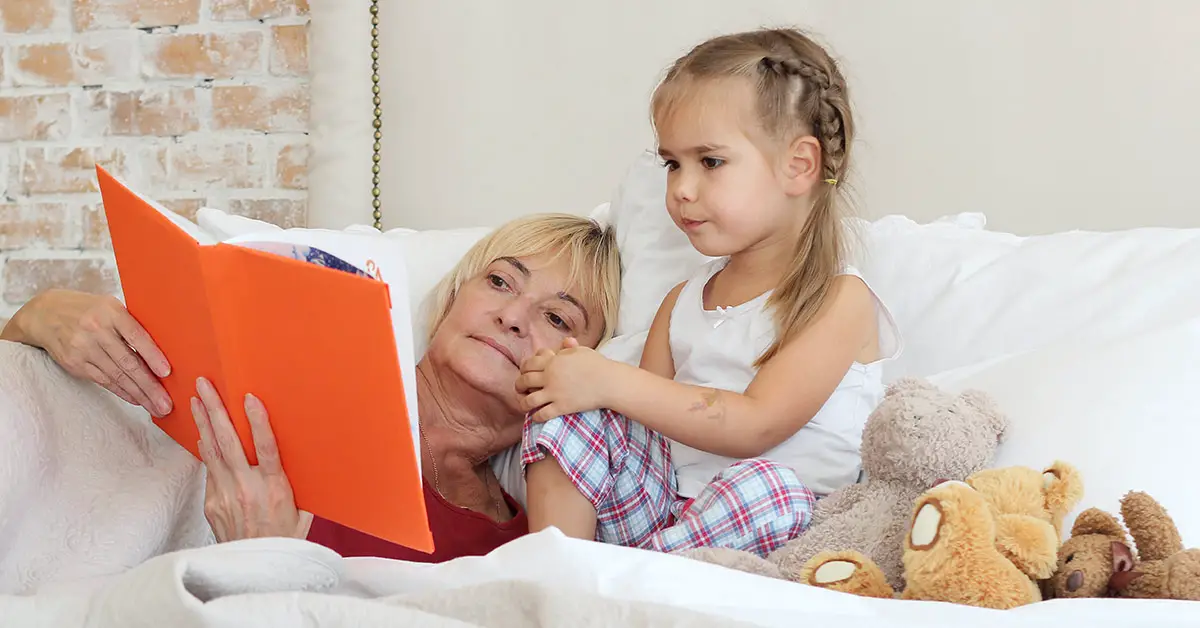A national poll from the C.S. Mott Children’s Hospital revealed that nearly two-thirds of mothers receive criticism for their parenting decisions. And as a mom, Caitlin Fladager is no stranger to judgemental people. However, of all parenting things to receive flack for, she is shamed for her kids having a sleepover at their grandparents once a week. So she took to Facebook in a heartfelt post, asking people, “Can we stop shaming parents for having a break from their kids, while they spend quality time with their grandparents?” [1]
“My kids go for a sleepover once a week at their grandparents”
“I don’t know when it became so un-normalized for children to have a good, close relationship with their grandparents,” Fladager wrote. “When I tell people my kids go for a sleepover once a week at their grandparents, they almost fall over and always end up shaming me. ‘I could never let my kids be watched by someone else weekly!’ They often say. They are not ‘being watched.’ They are spending important time with their grandma and papa.”
Not every child is able to have grandparents in their lives. However, those who do often treasure their relationship with them, including Fladager. “It takes a village to raise children, and I am forever grateful for mine.”
Likewise, grandparents often treasure every moment with their grandkids. “My parents look forward to having my children once a week and plan out so many exciting activities to do with them. My children also can’t wait for the day that they know they get to spend the whole time with their grandparents, and constantly ask when they get to go see Papa and Grandma again.”
Fladager additionally takes down the condescending phrase ‘dumping the kids off at the grandparents’. It’s a mean and untrue depiction of this sleepover situation. “Stop shaming moms whose kids have a very close relationship with their grandparents. Stop looking at it as ‘oh wow they just dump their kids off on their parents.’ We are a family. We help each other. We take care of each other. No one is being dumped on anyone.”
Read: Grandmothers: They can’t get enough of their grandkids
“One of the most important relationships they will ever have”
Instead, Fladager asks for people to see the many positives to grow up with close grandparents. “Start looking at it as ‘wow, how awesome those kids are growing up so close to their grandparents. Their time left on earth is uncertain, so how great they get to make memories right now.’ My kids keep my parents young, and my parents teach my kids things I can’t yet.
“I will be forever grateful for my village,” she concludes her post. “I will be forever grateful my kids are so close to their grandparents. It’s one of the most important relationships they will ever have.”
Stop The “Mom-Shaming,” it’s just a sleepover
“Mom-shaming is when other people criticize or shame a mom about her style of parenting in a way that makes the mom feel guilty, ashamed or bad about what she is doing,” said Dr. Melissa Wilkes Requenez, assistant professor in the Menninger Department of Psychiatry and Behavioral Sciences at Baylor College of Medicine. [2]
Unfortunately, it’s not uncommon for people to give mothers a hard time with their parenting skills. It’s even more likely for relatives to criticize mothers. You may have heard these kinds of comments yourself. The side-eye with the accompanying, “Are you sure you should let your child do/eat that?” Or there’s the often-well-meaning but very unsolicited advice on how the mom should be sleeping, organizing, feeding her kids, and discipline her kids. Or in this case, it’s giving a mom a hard time for ‘dumping her kids at their grandparents for a sleepover.’
“Mothers start getting input about their parenting when they’re pregnant, people pat their abdomen, people say, you should be getting off your feet,” said Dr. Barbara Howard, an assistant professor of pediatrics at Johns Hopkins School of Medicine. “There are a thousand things people feel they have permission to say about their parenting.” [3]
Read: 9 things your parents fed you that you wouldn’t dream of giving your kids
Build Mothers Up, Don’t Tear Them Down
Most mothers already deal with mom-guilt and constantly second-guessing themselves. The criticism can exacerbate these feelings. Especially because people tend to jabber on about critiques while being slow to compliment mothers.
“They may criticize others because they feel insecure or have low self-esteem,” Requenez said. “Sometimes within families, there is a desire to help that is essentially misguided or verbalized wrong. A lot of people may not even realize how harmful their remarks or critiques can be. There also is a competitive spirit that is going on in our culture about which way is best to parent and people wanting to prove that their method is the best.”
Having a good support system is essential to help moms deal with criticism. It’s also ideal if moms have people with thorough knowledge about the subject to ask advice from. Even so, people should also become keener to praise mothers for their efforts instead of berating them.
“No one ever says anything good to parents, like ‘Oh, I think you handled that tantrum beautifully,’” Howard said. “How often does anybody ever say to you, ‘You did a magnificent job of managing that. We all know positive feedback is much better than negative feedback.”
Keep Reading: 50 Times People Realized Their Grandparents Were Cooler Than Them
Sources
- “Caitlin Fladager.” Facebook. August 31, 2020
- “How to deal with mom-shaming.” Baylor College of Medicine. July 12, 2018
- “Most Mothers Feel Judged, With Families Often the Worst Critics.” The New York Times. Perri Klass, M.D. August 7, 2017

